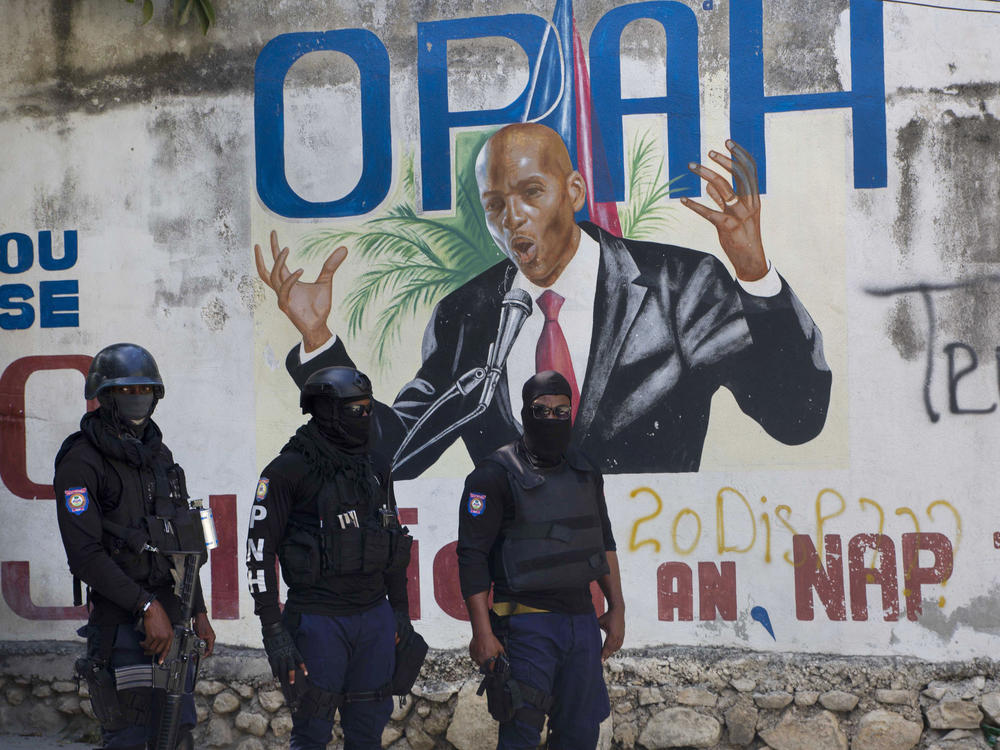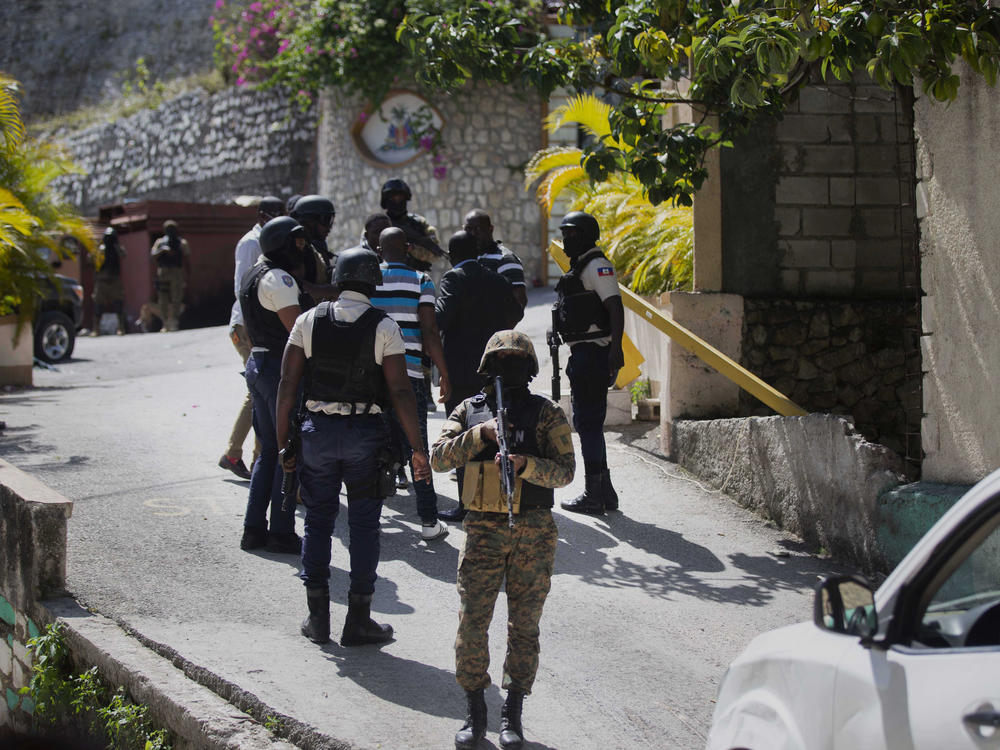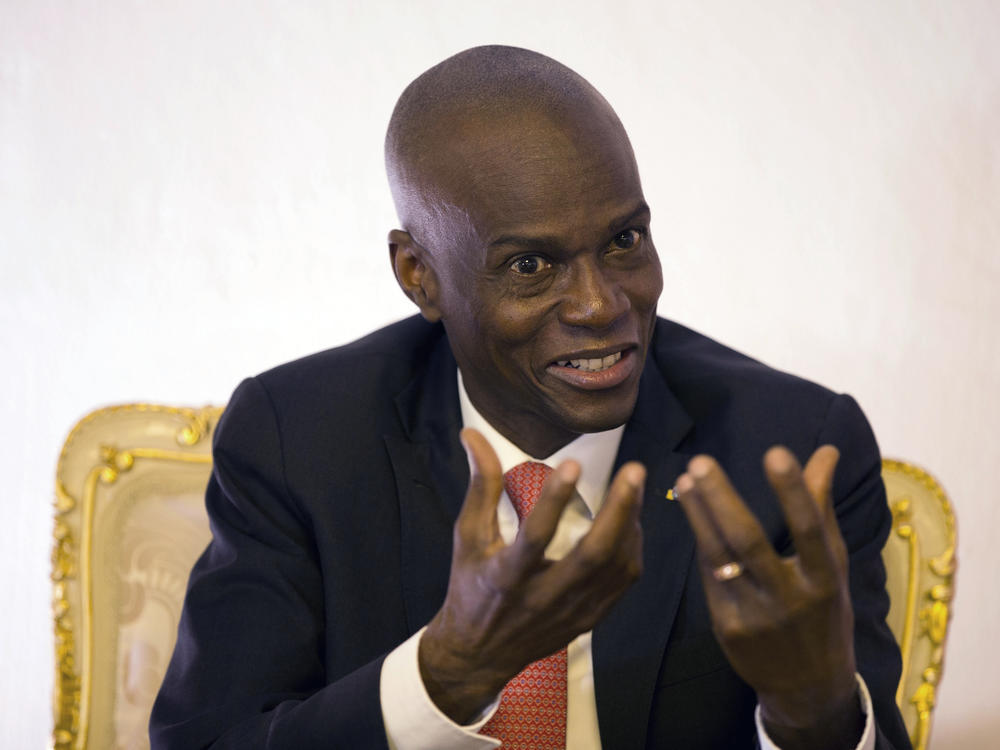Section Branding
Header Content
What We Know About The Assassination Of Haiti's President
Primary Content
Updated July 8, 2021 at 11:28 AM ET
Why did heavily armed men gun down the president of Haiti? Police say they killed four suspects in a tense hostage situation and arrested two others, but who the suspects are and their motivation remain a mystery.
Haitian authorities have reacted quickly to the attack: arresting alleged gunmen, closing borders and instituting martial law.
Jovenel Moïse was killed in his home early Wednesday, according to authorities. His wife and Haiti's first lady, Martine, was shot and injured as well. She was reportedly in stable but critical condition and has been sent to Miami for treatment.
Police say some suspects were killed or arrested
Just hours after the attack at Moïse's home, Haiti's police chief announced that, following what appeared to be a hostage-taking situation, four suspects were fatally shot by police and two others arrested.
Léon Charles, the police chief, said three police officers were held hostage but have since been freed. Authorities are still pursuing some suspects, he said.
Charles called the gunmen responsible for Moïse's killing "mercenaries." They have not released names, nationalities, or other information about the suspects.
Bocchit Edmond, the Haitian ambassador to the United States, said the attackers posed as agents of the U.S. Drug Enforcement Administration, likely gaining entry to Moïse's home by using that identity.
Edmond said the murder of the president had been carried out "by well-trained professionals, killers, commandos" speaking Spanish. There are other reports that the gunmen also spoke English. Haiti's primary languages are French and Creole.
Prime minister declares a "state of siege"
Joseph, the acting prime minister, decreed a two-week "state of siege" following Moïse's killing.
It's not clear exactly what that entails, though it appears to mean 15 days of martial law, according to a government journal reviewed by The New York Times.
But only Parliament can declare a state of siege, an expert told the Times, and the country does not currently have a functional Parliament.
President Biden condemned what he called the "horrific assassination" of Haiti's leader.
"We condemn this heinous act," he said in a statement. "We stand ready to assist as we continue to work for a safe and secure Haiti."
In brief remarks to reporters, Biden called the situation "worrisome" and said more information was needed about what happened.
What's next for Haiti?
Joseph, the interim prime minister, urged residents to remain calm following the shocking developments of the past day. He remains the top official in charge, though he was supposed to be replaced by Ariel Henry, who was named by Moïse on Monday to be the new prime minister.
In an interview with The Associated Press, Henry said that he himself is the prime minister. In an different radio interview cited by the AP, Henry said there was no fight between him and Joseph, "I only disagree with the fact that people have taken hasty decisions ... when the moment demands a little more serenity and maturity."
Joseph told the AP that he supports an international investigation into Moïse's killing and that he believes the elections scheduled for this year should take place.
Haiti was already in crisis before its president's assassination, according to experts.
Political instability, the lasting effects of a devastating earthquake and a cholera epidemic, foreign political meddling, and gang violence have all contributed to serious instability in the country.
"You have this situation where the institutions are not working, where the economy is stagnated ... the politics has been extremely volatile. The current government has been challenged by the population. There have been massive accusations of corruption," Robert Fatton, an expert on Haitian politics at the University of Virginia, told NPR. "So you name it, in terms of instability and institutional decay, you have it at the moment in Haiti."
Among Haitians, however, Moïse's shocking killing has caused confusion and widespread anxiety as officials declared a "state of siege" in the country and closed the international airport.
Haiti's neighbor, the Dominican Republic, announced it would close its border and reinforce security to prevent any assassins from leaving Haiti.
Who was President Moïse?
Prior to his killing, opponents of the president tried to remove the 53-year-old from office, claiming he was improperly attempting to extend his presidency.
Moïse was not well-liked in the country and was overall rated fairly low by citizens, according to Garry Pierre-Pierre, founder of The Haitian Times, who spoke to Morning Edition early Thursday.
Before he was handpicked by the previous president, Moïse worked in agriculture as a banana exporter.
He took office in 2017 after a protracted and contested election. But once in office, his leadership was no less chaotic.
Moïse had stripped rival political parties, businesspeople and prominent families of power. He made a lot of enemies, according to François Pierre-Louis, an expert on Haitian politics at Queens College at the City University of New York.
"[The attack] could have come from anywhere. And he alienated too many people," Pierre-Louis told NPR.
For more than a year before his death, Moïse had been ruling by decree after he failed to hold legislative elections and Parliament dissolved. Earlier this month, the U.N. Security Council said it was deeply concerned.
NPR's Laurel Wamsley contributed to this report.
Copyright 2021 NPR. To see more, visit https://www.npr.org.



